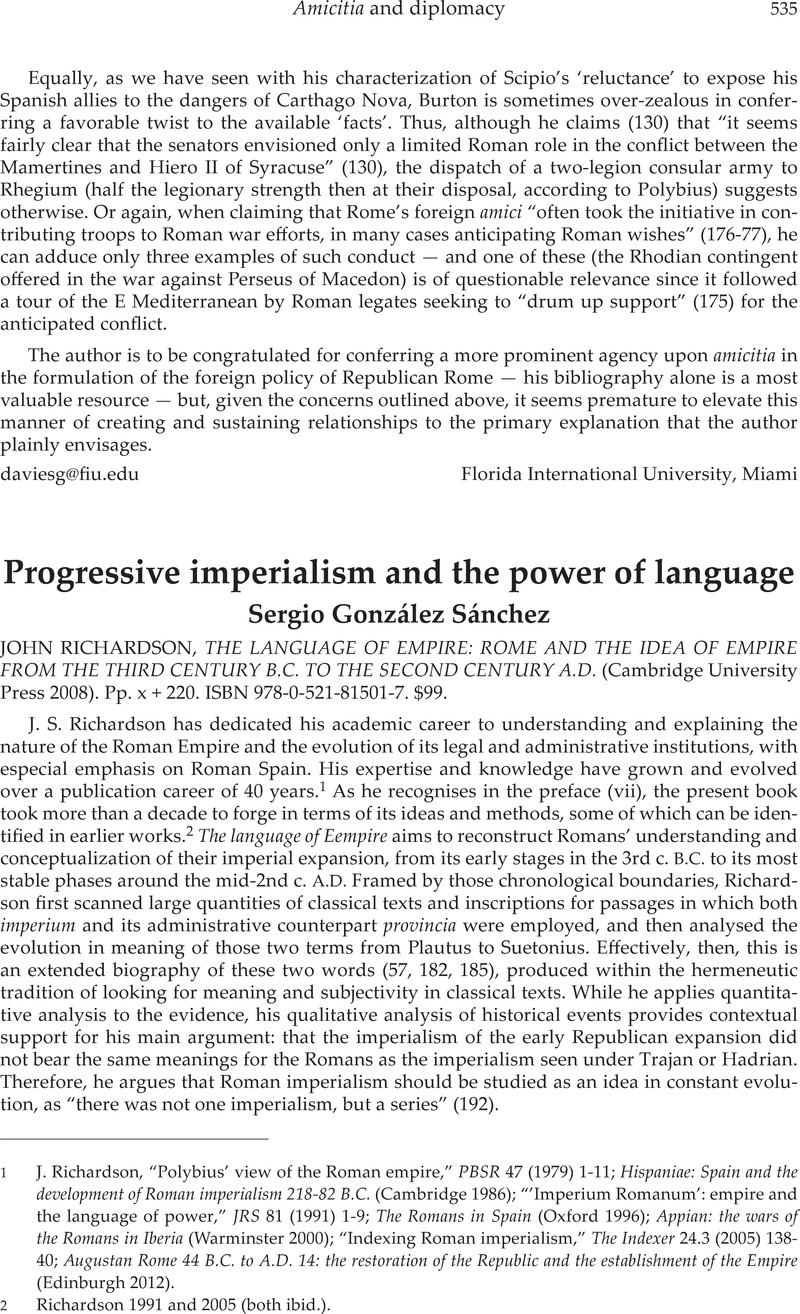No CrossRef data available.
Published online by Cambridge University Press: 27 November 2014

1 Richardson, J., “Polybius’ view of the Roman empire,” PBSR 47 (1979) 1–11 Google Scholar; Hispaniae: Spain and the development of Roman imperialism 218-82 B.C. (Cambridge 1986)Google Scholar; “’Imperium Romanum’: empire and the language of power,” JRS 81 (1991) 1–9 Google Scholar; The Romans in Spain (Oxford 1996)Google Scholar; Appian: the wars of the Romans in Iberia (Warminster 2000)Google Scholar; “Indexing Roman imperialism,” The Indexer 24.3 (2005) 138–40Google Scholar; Augustan Rome 44 B.C. to A.D. 14: the restoration of the Republic and the establishment of the Empire (Edinburgh 2012)Google Scholar.
2 Richardson 1991 and 2005 (both ibid.).
3 Isaac, B., “The meaning of the terms limes and limitanei,” JRS 78 (1988) 125–47Google Scholar; cf. Malloch, S. J. V., review of Richardson at CW 103 (2010) 560 Google Scholar, who mentions Vogt, J., Orbis Romanus: zur Terminologie des römischen Imperialismus (Tübingen 1929)Google Scholar.
4 Blois, L. De et al. (edd.), The representation and perception of Roman imperial power (2002)Google Scholar.
5 Webster, J., “Creolizing the Roman provinces,” AJA 105 (2001) 209–25CrossRefGoogle Scholar; Hingley, R., Globalizing Roman culture: unity, diversity and empire (London 2005)CrossRefGoogle Scholar; Mattingly, D. J., An imperial possession: Britain in the Roman empire (London 2006)Google Scholar.
6 Reviews: Burton, P., CR 60 (2010) 538–40Google Scholar; Dillon, J. N., Ancient History Bulletin Online Reviews 1 (2011) 73–75 Google Scholar; Drogula, F. K., CJ 105 (2010) 374 Google Scholar; Malloch (supra n.3); Methy, N., BMCR 2009.09.68Google Scholar; Arena, V., JRS 102 (2012) 314–15Google Scholar.
7 Burton ibid. 539.
8 This quotation was already used by Burton (ibid. 539) to point out a very similar issue.
9 Drogula (supra n.4) 3.
10 Luttwak, E. N., The grand strategy of the Roman empire (Baltimore, MD 1976)Google Scholar; Whittaker, C. R., Frontiers of the Roman empire: a social and conomic study (Baltimore, MD 1994)Google Scholar; Mattingly, D. J. (ed.), Dialogues in Roman imperialism (JRA Suppl. 23, 1997)Google Scholar; Eckstein, A. M., Mediterranean anarchy, interstate war, and the rise of Rome (Berkeley, CA 2009)Google Scholar; id., Rome enters the Greek East: from anarchy to hierarchy in the Hellenistic Mediterranean, 230-170 B.C. (Oxford 2012).
11 Doyle, M. W., Empire (New York 1986)Google Scholar; Hingley, R., Roman officers and English gentlemen (London 2000)Google Scholar; id. (ed.), Images of Rome: perceptions of ancient Rome in Europe and the United States in the modern age (JRA Suppl. 44, 2001).
12 Mattingly, D. J., Imperialism, power, and identity: experiencing the Roman empire (Princeton, NJ 2010) 3–42 Google Scholar.
13 See Richardson’s book of 2012 (cited supra n.1).
14 Mommsen, Th. (transl. Dickson, W. P.), The history of Rome (London 1911)Google Scholar.
15 Harris, W. V., War and imperialism in Republican Rome 327-70 B.C. (Oxford 1979)Google Scholar.